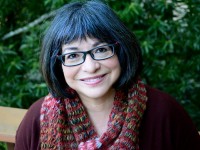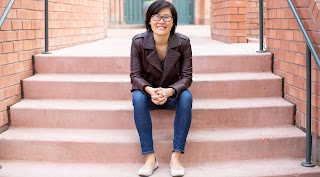Life in the Sandwich and Beyond: an interview with Susan Ito
Today
we are pleased to feature an interview with writer, performer, and MFA faculty
member Susan Ito. Here Susan talks with Sandy Chmiel about the importance of reading the work of writers of
color, how to balance writing with the rest of life, and the practice of
"walking and writing."
Can you tell us about your walking and writing practice? Is this something you encourage your students to try?
Yes. The process is simple. Walk in silence for one hour. There are no rules about what or how to think during this period. After an hour, come back to your writing place and write for another hour. It’s optional if you want to share your writing with a partner or friend. I began this process with my friend Michelle Valladares in 1996. We would walk together on the beach in San Francisco, or in the wooded trails of Oakland. Later, she moved to New York and we continued by walking and writing on our own and then faxing (!) or emailing the pages to each other to share. The process has been amazingly rich and surprising. If an hour feels like too much, you can start with 15 or 30 minute periods. Those work too!
Much of your fiction and nonfiction explores the theme of adoption. How do your life experiences as an adoptee inform your writing?
This experience has informed my entire identity. Issues of family, identity, belonging and secrets, find themselves into almost all of my writing in one way or another.
You wrote a column, "Life in the Sandwich," for Literary Mama. Tell us more about what "life in the sandwich" means to you, and how you balance your creative writing, your teaching career, and your family responsibilities.
I began that column when my children
were quite young. I was juggling parenting them and simultaneously dealing with
my parents’ needs on the opposite coast. It was a really stressful time. My
father had a catastrophic medical event and five years later he passed away,
and then my mother moved in with us. For many years we were a multigenerational
family. At first, my mother was an invaluable help in helping to care for my
children, and she really stepped up when I was awarded residencies and
fellowships at writing colonies. I was able to go to Hedgebrook, Blue Mountain
Center, and MacDowell and write, and she supported my husband in caring for the
girls at home. This was a tremendous gift. She is now 93 years old and needs
more support herself; the dynamics of the “sandwich” have shifted. She is the
one who needs care, and my daughters, now young adults, both have been
invaluable and compassionate caregivers for her. They have been incredibly
supportive in giving back to spend time with her.
In addition to writing and teaching, you also perform in your solo show, "The Ice Cream Gene." Tell us more about the show. How do you translate writing into performance, and how is writing for the stage different from writing for the page?
Becoming a solo performer was a real surprise to me, because I’d never had any acting talent or interest. The two solo shows I first witnessed happened to be about adoption – Alison Larkin’s The English American, and Lisa Marie Rollins’ Ungrateful Daughter. They blew my mind. I was mesmerized and immediately thought, I want to know how to do that! Lisa Marie introduced me to W. Kamau Bell’s Solo Performance Workshop in San Francisco, and I was hooked. There’s something about embodying a story – re-living it in a physical way – that is kind of electrifying. I also really enjoy the experience of sharing a story with an audience in the moment. Often, when we write a piece, we’re alone when we write it, and our readers experience it apart from us. With performing, we get that instant feedback. When an audience member gasps or laughs a few feet away from you, you can feel immediately that they get it. That’s so different from writing for the page. Writing prose and writing a script for performance use such different mindsets. One relies more on description, and inner reflection, and “telling.” But performance is all showing. Gesture, facial expressions, movement, dialogue. It’s a totally different way of writing, and I have come to really enjoy them both.
Becoming a solo performer was a real surprise to me, because I’d never had any acting talent or interest. The two solo shows I first witnessed happened to be about adoption – Alison Larkin’s The English American, and Lisa Marie Rollins’ Ungrateful Daughter. They blew my mind. I was mesmerized and immediately thought, I want to know how to do that! Lisa Marie introduced me to W. Kamau Bell’s Solo Performance Workshop in San Francisco, and I was hooked. There’s something about embodying a story – re-living it in a physical way – that is kind of electrifying. I also really enjoy the experience of sharing a story with an audience in the moment. Often, when we write a piece, we’re alone when we write it, and our readers experience it apart from us. With performing, we get that instant feedback. When an audience member gasps or laughs a few feet away from you, you can feel immediately that they get it. That’s so different from writing for the page. Writing prose and writing a script for performance use such different mindsets. One relies more on description, and inner reflection, and “telling.” But performance is all showing. Gesture, facial expressions, movement, dialogue. It’s a totally different way of writing, and I have come to really enjoy them both.
As an instructor in the Bay Path University MFA program, you stress the importance of reading the work of a wide range of writers of color. Can you tell us more about why that matters, how it contributes to students' awareness of diverse literatures, and what your own experience has been as an Asian-American writer?
Well, it matters for readers of color to have their experience mirrored or reflected. And it’s important for everyone else to experience stories of people whose lives are different. This is how we build compassion and justice in our society. So many writers (and readers) are influenced by a very narrow canon of published works. It’s important that what we read reflects the world that we live in – it honors experiences for readers of all backgrounds. I was recently so moved by that 11-year-old African American girl who started a book drive featuring books where “black girls are the main characters” because she was tired of books about “white boys and dogs.” She saw this as a problem, and in this very inspiring way is taking a proactive stand. As an Asian-American young reader, I was shocked and thrilled whenever I found books with Asian-American characters (who were not stereotypes). I think I was an adult before I read a book about a person of mixed race, and it made me cry. Until that moment I had felt like I was the only one of my kind, a real unicorn.
Well, it matters for readers of color to have their experience mirrored or reflected. And it’s important for everyone else to experience stories of people whose lives are different. This is how we build compassion and justice in our society. So many writers (and readers) are influenced by a very narrow canon of published works. It’s important that what we read reflects the world that we live in – it honors experiences for readers of all backgrounds. I was recently so moved by that 11-year-old African American girl who started a book drive featuring books where “black girls are the main characters” because she was tired of books about “white boys and dogs.” She saw this as a problem, and in this very inspiring way is taking a proactive stand. As an Asian-American young reader, I was shocked and thrilled whenever I found books with Asian-American characters (who were not stereotypes). I think I was an adult before I read a book about a person of mixed race, and it made me cry. Until that moment I had felt like I was the only one of my kind, a real unicorn.
Is there anything else you would like to share with us?
I had no idea what it would be like to teach in an online MFA program. I entered this experience with some trepidation, but I was inspired by director Leanna James Blackwell’s vision. I can say that I have been so very moved and impressed by the students in this program. They are such engaged, diligent, intelligent, curious and hard-working students. I love how much passion they bring to each discussion. It’s been an amazing pleasure to see the program grow and each semester has been better than the last.
******
Visit her website to learn more about
Susan.



Comments
Post a Comment